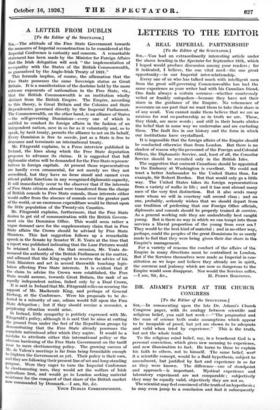A LETTER FROM DUBLIN
[To the Editor of the SPECTATOR.] Sot ,—The attitude of the Free State Government towards the measures of Imperial reconstruction to be considered at the Imperial Conference is curiosity and concern. A remarkable statement has been made by the Minister for Foreign Affairs that the Irish delegation will seek " the implementation of co-equality with the States of the British Commonwealth, as guaranteed by the Anglo-Irish Treaty of 1921."
This formula implies, of course, the. affirmation that the Free State possesses the same Sovereign status as Great Britain. It is a manifestation of the doctrine held by the more extreme exponents of nationalism in the Free State, viz., that the British Commonwealth is an institution wholly distinct from the British Empire. The Empire, according to this theory, is Great Britain and the Colonies and State Dependencies governed directly by the Imperial Parliament. The Commonwealth, on the other hand, is an alliance of States —the self-governing Dominions—every one of which is entitled to conduct its foreign affairs in the fashion of an independent nation, save in so far as it voluntarily and, so to speak, by tacit treaty, permits the alliance to act on its behalf. Every Dominion is free to secede, just as a State is free to denounce and terminate an international treaty.
Mr. Fitzgerald explains, in a Press interview published in Ireland, the lines along which the Free State deputation proposes to advance its claims. It is suggested that full diplomatic status will be demanded for the Free State represen- tatives in foreign capitals. At present those representatives are hardly even ornamental, for not merely are they not accredited, but they have no locus standi and cannot even attend public functions in any recognized diplomatic capacity. It will immediately occur to the observer that if the interests of Free State citizens abroad were transferred from the charge of British consuls to Free State consuls, those interests either would suffer from the absence of consuls over the greater part of the world, or an enormous expenditure would be thrust upon the little population of the Twenty-six Counties.
Mr. Fitzgerald explains, furthermore, that the Free State desires to get rid of communication with the British Govern- ment via the Dominion Office. This would seem rather a vague demand save for the supplementary claim that in Free State affairs the Crown should be advised by Free State Ministers. This last suggestion follows up a remarkable speech in the Senate by Senator W. B. Yeats at the time that a report was published indicating that the Lane Pictures would be retained in London. On that occasion, Mr. Yeats de- nounced the authority of the British Parliament in the matter, and affirmed that the King ought to receive the advice of his Irish Ministers and act in accord therewith touching legis- lation affecting Free State interests. It is evident that if the claim .to advise the Crown were established, the Free State would assume, towards Great Britain, the rank of an equally independent nation, linked only by a Dual Crown, It is said in Ireland that Mr. Fitzgerald relies on securing the support of Mr. Mackenzie King, and perhaps of General Hertzog, at the Conference. Were his proposals to be de- feated in a minority of one, odium would fall upon the Free State delegation ; but if they should receive a seconder, a Perplexing situation would arise.
In Ireland, little sympathy is publicly expressed with Mr. Fitzgerald's policy, although it is said that he aims at cutting the ground from under the feet of the Republican groups by demonstrating that the Free State already possesses the complete nationhood after which they aspire. It would be a mistake to attribute either this international policy or the obvious hardening of the Free State Government on the tariff issue to mere electioneering policy. The growing success of Mr. de Valera's meetings is far from being formidable enough to frighten the Government as yet. Their policy is their own, and they are following their present line of set and long-standing purpose. Were they eager to turn the Imperial Conference to electioneering uses, they would set the welfare of Irish agriculture first, and would go to London seeking material assistance for the conquest of that share of the British market now commanded by Denmark.—I am, Sir, &c.
Youa DUBLIN CORRESPONDENT.






















































 Previous page
Previous page